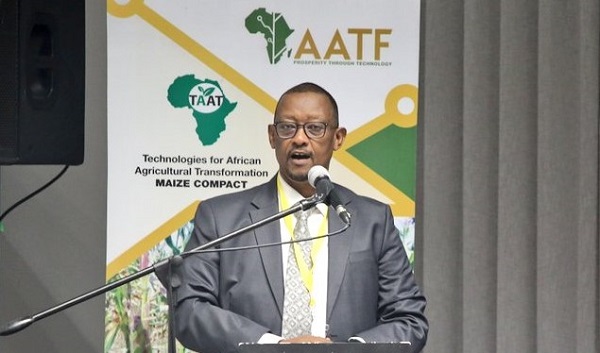
The African Agricultural Technology Foundation (AATF) has reinstated its dedication to improving food security in Africa by delivering genetically modified maize that is tolerant to drought and protected against insects.
The organisation’s executive director, Dr. Canisius Kanangire confirmed this commitment at the 5th TELA Maize Project Annual Review and Planning Meeting held in South Africa in April 2023. The purpose of the meeting was to review the progress made during the fourth year of project implementation and prioritise areas of focus for the fifth year.
Kanangire revealed that the TELA project has already produced maize varieties that are resistant to the stem-borer and fall armyworm, benefiting farmers in South Africa. These varieties have undergone regulatory approval in four other countries and are soon to be available to farmers in Ethiopia, Kenya, Mozambique and Nigeria. This achievement is the result of a decade of excellent breeding work under the Water Efficient Maize for Africa (WEMA) partnerships that began in 2008.
The TELA project aims to commercialise genetically modified maize that is drought-tolerant and insect-protected to address the persistent challenges facing smallholder farmers in Africa. The infestation of pests and diseases can lead to reduced yields, crop damage and complete crop loss, which can have severe economic consequences for smallholder farmers. The cost of controlling pests and diseases can also be prohibitive for many smallholder farmers, exacerbating the problem.
Kanangire emphasized the importance of long-term public-private partnerships in strengthening the maize value chain in Africa, contributing to food security, economic productivity, and the prosperity of farmers. He also noted that the TELA project’s successes in the environmental release of TELA products in Ethiopia, Nigeria, Kenya and Mozambique over the last three years are a cause for celebration. In the coming year, the project will focus on moving towards the commercialisation of TELA varieties in all target countries.
Since 2013, the WEMA/TELA project has released 125 DroughtTEGO® hybrids in the seven project countries. The TELA Partnerships are coordinated by AATF, an organisation that facilitates public-private partnerships for access and delivery of appropriate technologies to farmers in Sub-Saharan Africa.
The other partners in the project include the national agricultural research systems in Ethiopia, Kenya, Mozambique, South Africa, Nigeria, Tanzania and Uganda, as well as the International Maize and Wheat Improvement Center (CIMMYT) and Bayer Crop Science, a statement from the AATF communications officer for East and Southern Africa, George Achia, said.
During the event, Mr. Lawrence Kent from the Bill and Belinda Gates Foundation and Dr. Faith Tarr from the United States Agency for International Development (USAID) praised the TELA project team for their efforts in addressing farming challenges facing maize farmers in Africa.
The TELA project aims to enhance food security in Sub-Saharan Africa by providing farmers with genetically modified maize that is resistant to drought and pests, thus improving their productivity and livelihood.


